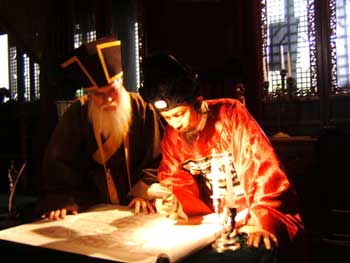
 |
jescom | meetings | documents | links | sjweb |
Paul Xu Guangqi - China's Man for All Seasons

The documentary series has since been broadcast a number of times on JBC's international channel which is available internationally on both satellite and the internet. KPS personnel monitored both satellite and internet broadcasts in Taipei and were very pleased with the broadcast quality, the times and the frequency of the broadcasts. JBC will continue to broadcast the series repeatedly over their TV channels. They operate eight TV channels. As a non-competitive entry in this year's Shanghai International Film and TV Festival, the series was broadcast twice over Shanghai's popular documentary TV channel.
The series consists of four 27-minute parts. The first covers Xu's background, his meeting with Ricci, Ricci's revolutionary world map, Xu's Baptism, and their individual journeys to Bejing. The second episode, Confucius Meets Euclid, showed the Xu-Ricci collaboration on translations of religious and scientific works included the first six books of Euclid's Elements, credited with introducing geometry and western scientific method to China. Xu Guangqi's Green Revolution, described Xu's lifelong concern with the well-being of his country folk, especially their struggle with natural disasters and famine, motivated him to develop innovations in agriculture that saved countless lives and boosted China's population growth. Finally, the fourth part showed how Xu's efforts synchronized with the Western World. Xu enlisted the collaboration of Jesuit missionaries to correct and revise the traditional Chinese calendar. These and his other accomplishments have earned Xu Guangqi the title "forerunner of modern science in China." His collaboration with Ricci and other Jesuit missionaries is considered the first instance of significant cultural dialogue between China and the West.
Xu Guangqi's Green Revolution, described Xu's lifelong concern with the well-being of his country folk, especially their struggle with natural disasters and famine, motivated him to develop innovations in agriculture that saved countless lives and boosted China's population growth. Finally, the fourth part showed how Xu's efforts synchronized with the Western World. Xu enlisted the collaboration of Jesuit missionaries to correct and revise the traditional Chinese calendar. These and his other accomplishments have earned Xu Guangqi the title "forerunner of modern science in China." His collaboration with Ricci and other Jesuit missionaries is considered the first instance of significant cultural dialogue between China and the West.
In the future, KPS plans to produce a one-hour version of this documentary geared to the needs and tastes of the international audience and focusing on the relationship between Matteo Ricci and Xu Guangqi. An important result of Kuangchi's collaboration with Jiangsu TV has been the establishment of a close relationship with its management and producers. The Director of Jiangsu TV, Ms. Zhou Li, is in charge of communications and culture (newspapers, books, broadcasting, etc.), for the whole of China's Jiangsu Province. KPS now has an agreement with JBC to produce a two-part documentary on the German Jesuit missionary Fr. Adam Schall von Bell, SJ who continued the mission of Matteo Ricci in China's Imperial Court. We will keep you informed on the progress of this project.
Twenty-one years after its last major expansion of television production facilities, Kuangchi Program Service (KPS) is taking steps to move to digital production of its Taiwan-based TV, video and internet programs. The digital revolution--with satellite, cable and internet broadcasting-- opens new opportunities for KPS to distribute its programs over a larger area, with greater penetration, quality and frequency than ever before. The Internet is creating new channels for access, dialogue and interaction with overseas audiences, especially in Mainland China.
Of the tiny number of Catholic radio and television organizations that have programs broadcast into the People's Republic of China, KPS produces the largest volume of TV programs and has the largest potential audience. Its English-conversation TV series is a daily feature of the Phoenix Channel, mainland China's most-watched satellite TV channel with a potential audience of 47 million households.
KPS productions focus especially on educational programming for children, youth, the elderly and marginalized. Its programs entertain and teach while communicating positive human values including dialogue, reconciliation, peace and harmony. KPS creatively promotes respect for life, the environment and all religions. While KPS does not explicitly stress its Catholicity, most people know that KPS is Christian in its orientation and motivation. In its mission statement Kuangchi says that it "produces high-quality audio-visual programs and provides media services that promote cultural exchange, mutual understanding, and Gospel values throughout the Chinese world and among all the peoples of Asia, in order to raise appreciation for the meaning and quality of Life."
Kuangchi first started producing radio programs in 1958 and quickly moved into the new medium, television. In 1963 it became Taiwan's first independent television production center and had equipped its own studios for black and white TV production within two years. KPS began videotaping in color in 1970 and by 1975 had a number of award-winning social-educational TV series and documentaries. The next major milestone came when KPS inaugurated its new TV studio and production building, which featured what was then state-of-the-art one inch video tape machines. At the height of that era of production, KPS had a staff of over 150 people doing both radio and television from two full-sized studios. In the recent years the number of full-time employees has dropped to just over 40, as Kuangchi hires people as needed for productions.